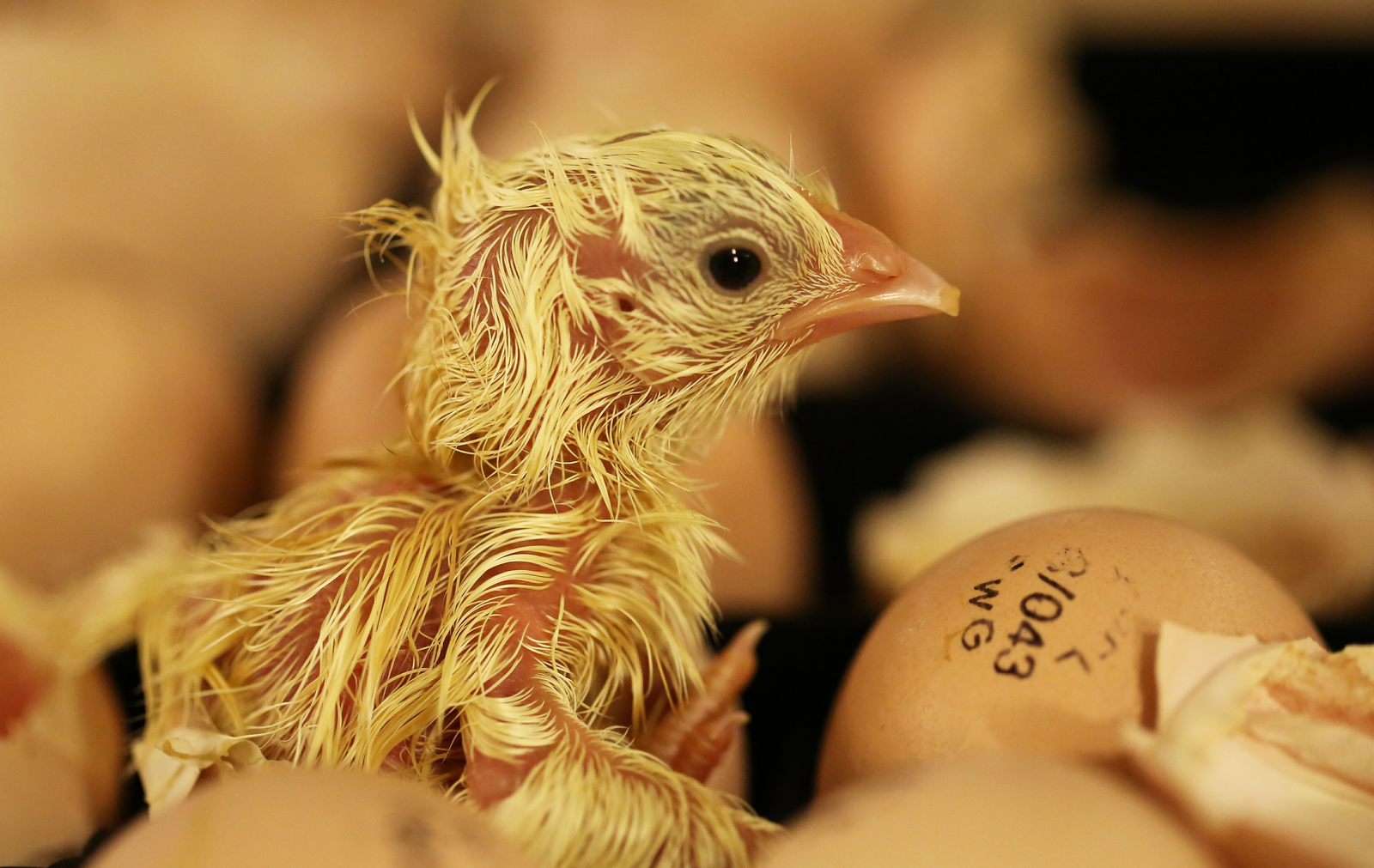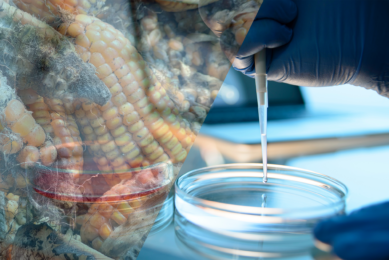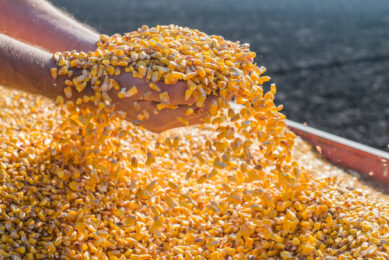Poultry diseases spurred by mycotoxins

Suppressed immune function by mycotoxins can eventually decrease resistance to infectious diseases in poultry. It can also have an effect on the efficacy of vaccinations.
The rapidly expanding US ethanol industry is generating a growing supply of co-products, mostly in the form of dried distillers’ grain and solubles (DDGS). In the United States, 90% of the co-products of maize-based ethanol are fed to livestock. An unintended consequence is that animals are likely to be fed higher levels of mycotoxins. During the production of ethanol from maize, mainly the endosperm (82% of the grain) undergoes fermentation and distillation processes. For dry-milled products, the most highly mycotoxin-contaminated fractions are those that contain the whole or the outer portions of the grain1. Based on this knowledge it is widely accepted that the co-products of ethanol production will concentrate by up to three times the previously existing mycotoxins in maize2. The use of DDGS in poultry diets has increased as the availability of this reasonably priced feed ingredient has risen over the past several years. The US Poultry & Egg Association published preliminary results of research where certain levels of DDGS (15% in poultry diets) may lead to decreased bird performance. When the birds have a mild to moderate C. perfringens challenge, this can lead to more severe cases of necrotic enteritis as well as a decrease in technical performance.
Mycotoxins and NE
The disease necrotic enteritis was first described in chickens in England in 1961 and since that time has been reported in the majority of countries around the world. Necrotic enteritis has been identified in broilers, laying hens, turkeys and quail. It has been estimated to affect up to 40% of US commercial broiler flocks and is believed to cost the industry about 5 dollar cents per broiler in the United States3. Necrotic enteritis is caused by toxins produced by Clostridium perfringens. While anything that causes intestinal irritation can lead to necrotic enteritis, stress, intestinal disease (particularly coccidiosis), intestinal parasites (especially round worms), and immune suppression by mould toxins (mycotoxins), chicken anaemia virus, Gumboro disease or Marek’s disease have all been specifically linked to the disease. Avian mycotoxicosis is considered to be one of the most important problems in the poultry industry. It causes severe losses not only in terms of lost performance, but also as an immunosuppressive agent increasing the bird’s susceptibility to diseases and mortality. The gastrointestinal tract represents the first barrier against ingested chemicals, feed contaminants and natural toxins. Following ingestion of mycotoxin-contaminated feed, intestinal epithelial cells can be exposed to toxins. Direct intestinal damage can be exerted by the biological action of mycotoxins. Trichothecenes like deoxynivalenol (DON) or T-2 toxin affect actively dividing cells such as those lining the gastrointestinal tract. It should be noted that the gastrointestinal tract is also sensitive to trichothecene induced apoptosis affecting mainly the gastric mucosa, gastric granular epithelium and intestinal crypt cell epithelium4. The toxic action of trichothecenes results in extensive necrosis of oral mucosa and gizzard lesions5. The T-2 toxin inhibits DNA, RNA and protein synthesis in eukaryotic cells, affecting the cell cycle and inducing apoptosis programmed death of cells6. Antonissen et al (2012) found that feeding deoxynivalenol (DON) contaminated feed in concentrations lower than the maximum EU guidance contamination level of 5 ppm to broilers is a predisposing factor for the development of necrotic enteritis. DON was able to replace the most well-known predisposing factor of necrotic enteritis which is coccidiosis. According to a study from 20107 the combination of DON, zearalenone (ZEN) and fumonisins alters the Eimeria-induced immune response (Girgis et al, 2010). Moreover, mycotoxin contamination of broiler feed may reduce the efficacy of anti-coccidial treatment with lasalocid8.
Role of mycotoxins in vaccination failure
It is well known that immunity acquired through vaccination can be impaired by ingestion of mycotoxins. An Egyptian study9 revealed that mycotoxicosis might be the cause of vaccination failure against Avian Influenza virus. Mycotoxin induced immunosuppression may be manifested as depressed T- or B-lymphocyte activity and suppressed production and impaired macrophage/neutrophil-effector functions10. Mycotoxins reduce the level of antibodies following infection or vaccination and reduce the activity of phagocytic cells. Suppressed immune function by mycotoxins can eventually decrease resistance to infectious diseases, reactivate chronic infections and/or decrease vaccines efficacy11. The presence of mycotoxins in poultry rations could therefore lead to a breakdown in vaccinal immunity and to a consequent increase in the occurrence of diseases such as infectious bursal disease virus (IBDV)12 or Adenovirus13.
Low levels of toxins in rations, below observable overt toxicity, are also likely to alter normal immune functions. Deoxynivalenol (DON) can modulate immunological parameters. Determination of serum titres of antibodies against Newcastle Disease (NCD) after regular vaccination is a method, which can be used to evaluate immuno-modulating effects of certain mycotoxins in vivo.
Table 1 reports the results of a study designed to quantify the impact of mycotoxin ingestion by broilers on response to NCD vaccination and to determine the efficacy of a mycotoxin deactivation product to mitigate those effects. From the results it can be concluded that the addition of the Fusarium mycotoxins (deoxynivalenol and zearalenone) had a significant decreasing effect on anti-NCD titre compared with the control group. The supplementation of a mycotoxin deactivation product without mycotoxins did not result in a change of NCD-antibodies versus the level in the control group. The reduction in anti-NCD titre with mycotoxins was counteracted completely by the addition of an effective mycotoxin deactivation product to the contaminated feed.
Conclusion
Mycotoxins may alter animals’ susceptibility to infectious diseases by affecting intestinal health and the innate and adaptive immune systems. Further research will be necessary to investigate the effects of mycotoxins on infectious diseases and to develop practical, economically justified solutions to counteract mycotoxin contamination of feed and its effects on animal health. The results of the mentioned studies indicate that the use of effective mycotoxin control which is currently available offers an opportunity to significantly modify animal response to vaccination and help to improve animal health and performance.
References 1-13 are available on request.
The author can be contacted at: r.borutova@nutriad.com
[Source: Managing mycotoxins 2014]











